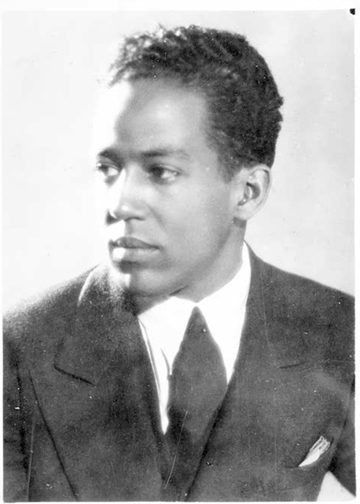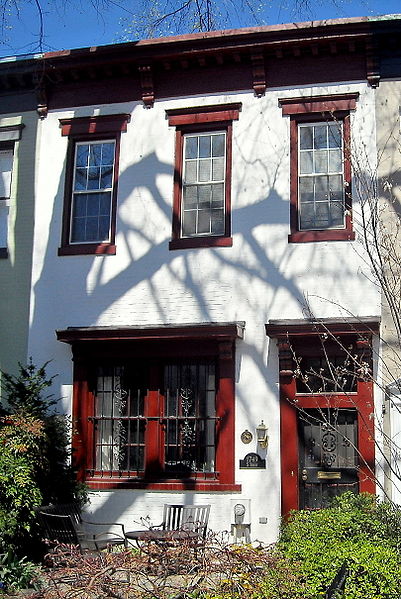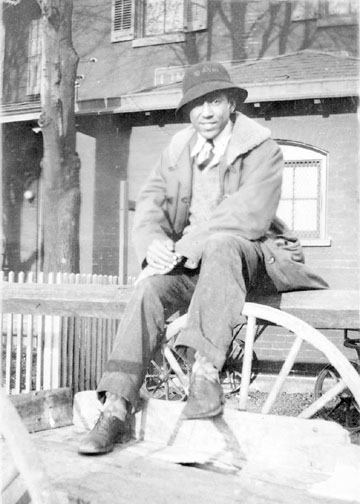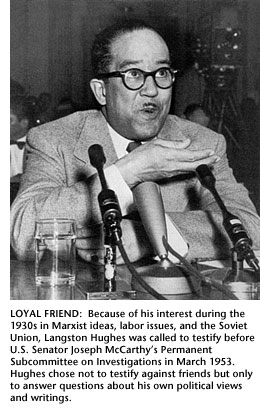American Writer and Poet Langston Hughes (1902-1967)

Ourenglish.org qualifies as fair use under United States copyright law
(This work has been released into the public domain
by the copyright holder. This applies worldwide.)
James Mercer Langston Hughes, (February 1, 1902 – May 22, 1967) was an American poet, novelist, playwright, short story writer, and columnist. He was one of the earliest innovators of the new literary art form jazz poetry. Hughes is best-known for his work during the Harlem Renaissance.
Langston Hughes was born in Joplin, Missouri, the second child of school teacher Carrie (Caroline) Mercer Langston and her husband James Nathaniel Hughes (1871-1934). Both parents were mixed-race, and Langston Hughes was of African American, European American and Native American descent. He grew up in a series of Midwestern small towns. Both his father's grandmothers were African American, and both his father's grandfathers were white: one of Scottish and one of Jewish descent. While in grammar school in Lincoln, Illinois, Hughes was elected class poet. Hughes stated in retrospect he thought it was because of the stereotype that African Americans have rhythm. "I was a victim of a stereotype. There were only two of us Negro kids in the whole class and our English teacher was always stressing the importance of rhythm in poetry. Well, everyone knows — except us — that all Negroes have rhythm, so they elected me as class poet." During high school in Cleveland, Ohio, he wrote for the school newspaper, edited the yearbook, and began to write his first short stories, poetry, and dramatic plays. His first piece of jazz poetry, "'When Sue Wears Red", was written while he was still in high school. It was during this time that he discovered his love of books. From this early period in his life, Hughes would cite as influences on his poetry the American poets Paul Laurence Dunbar and Carl Sandburg. Hughes earned a B.A. degree from Lincoln University in 1929. He then moved to New York. Except for travels to areas that included parts of the Caribbean, Hughes lived in Harlem as his primary home for the remainder of his life.
In 1932, Hughes became part of a group of blacks who went to the Soviet Union to make a film depicting the plight of African Americans in the United States. The film was never made, but Hughes was given the opportunity to travel extensively through the Soviet Union and to the Soviet-controlled regions in Central Asia, the latter parts usually closed to Westerners. In Turkmenistan, Hughes met and befriended the Hungarian polymath Arthur Koestler. Hughes also managed to travel to China and Japan before returning to the States. Hughes was accused of being a Communist by many on the political right, but he always denied it. When asked why he never joined the Communist Party, he wrote "it was based on strict discipline and the acceptance of directives that I, as a writer, did not wish to accept." In 1953, he was called before the Senate Permanent Subcommittee on Investigations led by Senator Joseph McCarthy. Following his appearance, he distanced himself from Communism and was subsequently rebuked by some who had previously supported him on the Radical Left. Over time, Hughes would distance himself from his most radical poems. In 1959 his collection of Selected Poems was published. He excluded his most controversial work from this group of poems.
 
As I Grew Older
by Langston Hughes |
|
It was a long time ago.
I have almost forgotten my dream.
But it was there then,
In front of me,
Bright like a sun--
My dream.
And then the wall rose,
Rose slowly,
Slowly,
Between me and my dream.
Rose until it touched the sky--
The wall.
Shadow.
I am black.
I lie down in the shadow.
No longer the light of my dream before me,
Above me.
Only the thick wall.
Only the shadow.
My hands!
My dark hands!
Break through the wall!
Find my dream!
Help me to shatter this darkness,
To smash this night,
To break this shadow
Into a thousand lights of sun,
Into a thousand whirling dreams
Of sun!
|
|
-
-
A New Song
by Langston Hughes
-
-
I speak in the name of the black millions
-
Awakening to action.
-
Let all others keep silent a moment
-
I have this word to bring,
-
This thing to say,
-
This song to sing:
-
- Bitter was the day
- When I bowed my back
- Beneath the slaver's whip.
-
- That day is past.
-
- Bitter was the day
- When I saw my children unschooled,
- My young men without a voice in the world,
- My women taken as the body-toys
- Of a thieving people.
-
- That day is past.
-
- Bitter was the day, I say,
- When the lyncher's rope
- Hung about my neck,
- And the fire scorched my feet,
- And the oppressors had no pity,
- And only in the sorrow songs
- Relief was found.
-
- That day is past.
-
- I know full well now
- Only my own hands,
- Dark as the earth,
- Can make my earth-dark body free.
- O thieves, exploiters, killers,
- No longer shall you say
- With arrogant eyes and scornful lips:
- "You are my servant,
- Black man-
- I, the free!"
-
- That day is past-
-
- For now,
- In many mouths-
- Dark mouths where red tongues burn
- And white teeth gleam-
- New words are formed,
- Bitter
- With the past
- But sweet
- With the dream.
- Tense,
- Unyielding,
- Strong and sure,
- They sweep the earth-
-
- Revolt! Arise!
-
- The Black
- And White World
- Shall be one!
- The Worker's World!
-
- The past is done!
-
- A new dream flames
- Against the
- Sun!
|
Negro Speaks of Rivers
by Langston Hughes |
|
I've known rivers:
I've known rivers ancient as the world and older than the
flow of human blood in human rivers
My soul has grown deep like the rivers.
I bathed in the Euphrates when dawns were young
I built my hut near the Congo and it lulled me to sleep.
I looked upon the Nile and raised the pyramids above it.
I heard the singing of the Mississippi when Abe Lincoln
went down to New Orleans, and I've seen its muddy
bosom turn all golden in the sunset
I've known rivers:
Ancient, dusky rivers.
My soul has grown deep like the rivers. |
|
Democracy
by Langston Hughes |
|
Democracy will not come
Today, this year
Nor ever
Through compromise and fear.
I have as much right
As the other fellow has
To stand
On my two feet
And own the land.
I tire so of hearing people say,
Let things take their course.
Tomorrow is another day.
I do not need my freedom when I'm dead.
I cannot live on tomorrow's bread.
Freedom
Is a strong seed
Planted
In a great need.
I live here, too.
I want freedom
Just as you.
|
|
|
I, Too
by Langston Hughes |
|
I, too, sing America.
I am the darker brother.
They send me to eat in the kitchen
When company comes,
But I laugh,
And eat well,
And grow strong.
Tomorrow,
I'll be at the table
When company comes.
Nobody'll dare
Say to me,
"Eat in the kitchen,"
Then.
Besides,
They'll see how beautiful I am
And be ashamed--
I, too, am America |
|

The former residence of Langston Hughes located at 1749 S Street, NW
in the Dupont Circle neighborhood of Washington, D.C. Built in 1890
(The photo is used under the terms of the GNU Free Documentation License, Version 1.2)

Langston Hughes while attending Lincoln University,1928
(Ourenglish.org qualifies as fair use under the United States copyright law.
This photo is in the public domain.)

(Ourenglish.org qualifies as fair use under the United States copyright law.
This photo is in the public domain.)
 
|


![]()
![]()
![]()
![]()
